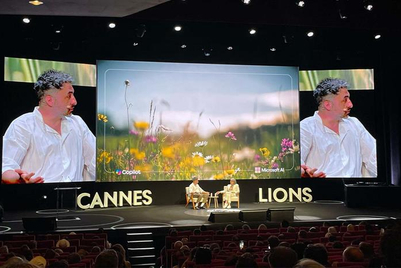
| PARTNER CONTENT |
2018 was a whirlwind of changes, and it continues to be a challenge to differentiate your brand and maintain trust in a world where everyone is vying for attention. The more you stay ahead of the curve, the better equipped you will be to adapt to change. What should advertisers and marketers look out for in 2019?
AI unlocked
For the past couple of years, artificial intelligence (AI) has been widely considered a transformative technology on the verge of disrupting every major industry, and is fast becoming a standard part of an advertising company’s repertoire.
Yet it hasn’t yet been implemented broadly enough to unlock its true value.
That’s all going to change in 2019.
AI is expected to be widely adopted across the digital ad landscape in 2019, from being the basis for cutting-edge AI-based ad targeting solutions, to building personalised consumer experiences on a daily basis.
The technology is also being used in the production process: a recent survey found that almost two-thirds of enterprise marketers expect to use AI in their content marketing strategy this year to better understand their customers and create personalised messages.
Power of audio
With colourful banner ads and video content competing for eyeballs, it can be easy for advertisers to forget about the power of audio. But as we enter 2019, this programmatic opportunity is becoming harder to ignore. In fact, audio takes up the largest proportion of mobile phone usage, with the average consumer listening for 52 minutes every day. Driven by growing mobile device ownership – and compounded by the rise in streaming radio, podcasts, audiobooks and voice assistants – digital audio is here to stay.
Spotify was an early-mover in offering programmatic audio, and other streaming services are following suit. Growing adoption rates among voice-activated smart home speakers and subscription services lend further momentum to this trend, and as these technologies evolve, so do the opportunities for brands to connect with audiences in new and exciting ways.
This year, digital audio is expected to reach marketplace maturity as an ad medium. If advertisers want to tap into today’s key trends and reach audiences more effectively, they need to consider programmatic audio as part of any well-rounded campaign.
The explosive growth of e-commerce
According to an eMarketer study, the e-commerce sector is estimated to experience double-digit growth until 2021, with sales expected to exceed US$4 trillion by 2020. Few industries can boast such a promising future, and businesses must innovate to take advantage of the e-commerce boom, or risk falling behind.
This rings especially true in Asia-Pacific, where an expanding middle class, extensive mobile and internet penetration, and improving logistics and infrastructure have led to an explosive growth in e-commerce. The region is now the world’s largest retail ecommerce market, with sales expected to reach US$2.725 trillion by 2020.
A surge in video content, personalised ads, advanced filtering and immersive digital experiences are just a few of the changes in e-commerce that will affect the advertising industry over the next few years. The potential here is massive, and if implemented correctly, can completely change how users interact with ads altogether.
Everything is now On-The-Go (OTG)
Less than 50 years ago, mobile phones didn’t exist. But today, it’s near impossible to imagine life without one. In fact, an estimated 84% of people can’t go a single day without their phones! We use them on a daily basis for communicating, navigating and shopping.
The Asia-Pacific region is leading the drive for e-commerce, with India, Thailand and Indonesia having the highest mobile wallet adoption rates. Mobile payments in China alone dwarfed those in the U.S. by more than 25,000% over a recent 10-month period, with US$12.8 trillion changing hands in China compared to only US$49.3 billion in the U.S. The rate of adoption across sectors such as retail, financial and on-demand services – from food delivery to ride sharing – has played a crucial role in this rapid growth.
Before, it was mobile phones that drove up online screen time. Now OTG is driving mobile phones sales.
Less ads, more storytelling
A 2015 report by Nielsen found that respondents trusted recommendations from people they know the most. This was followed by branded websites, editorial content, and consumer opinions posted online. By comparison, in-your-face ads trailed behind in the list of advertising format that people trusted.
As part of an effort to increase trust and authenticity, brands are starting to work with micro-influencers as opposed to social media personalities with larger followings. Micro-influencers appear more relatable, engaging and reliable to their audiences, and tend to be more knowledgeable or have followers more suited to a brand’s particular niche.
Brands also need to be smart with their story-telling, or the message risks getting lost in the deluge of information.
Bite-sized, six-second video ads and non-skippable longer interactive ads tend to have higher rates of interaction. A new type of ad has also emerged in China during online TV breaks. These ads utilise the TV shows’ original content and narrative arcs, and feature the same actors in their on-screen costumes, piquing the audience’s interest by making the ad almost indistinguishable from the original content. This type of advertising is projected to surpass 2 billion yuan (US$311 million) in sales revenue this year, and this figure will continue to grow over the next year.
Targeted results is key
A recent report looking into digital marketers’ top media investment priorities for the next 12-24 months found that 86% of respondents around the world expect to increase their investment in outcome-driven media.
The term ‘outcome-driven media’ refers to planning and optimising campaigns against KPIs that are much more closely aligned to the marketer’s ultimate marketing and business goals.
While results showed some variation across regions, industries, and level of digital media investment, marketers across the globe are united in their desire to continuously improve the way they measure the value of their efforts.
Anyone tasked with growing a brand’s exposure needs to be able to confidently address growing media complexity and understand the impact of campaigns on business results. So it’s no surprise that marketers in our day and age hunger for new ways to measure their efforts and demonstrate the real effect their media placements have on their company’s bottom line.
Conclusion
As with any industry, advertising isn’t perfect, but its future is bright. As advertisers become more familiar with the full potential of AI and mobile, they will deliver more personalised experiences to consumers, and sophisticated insights to clients. And as brands tap into greater creativity, they will find it easier to draw genuine interest and build closer connections with consumers.
While there’s no magic formula to building the perfect advertising strategy, taking heed of these six trends will help you stay ahead of the pack.
| READ MORE ON THE XAXIS HUB |


.jpg&h=334&w=500&q=100&v=20250320&c=1)


.png&h=334&w=500&q=100&v=20250320&c=1)




.png&h=334&w=500&q=100&v=20250320&c=1)





.png&h=268&w=401&q=100&v=20250320&c=1)


